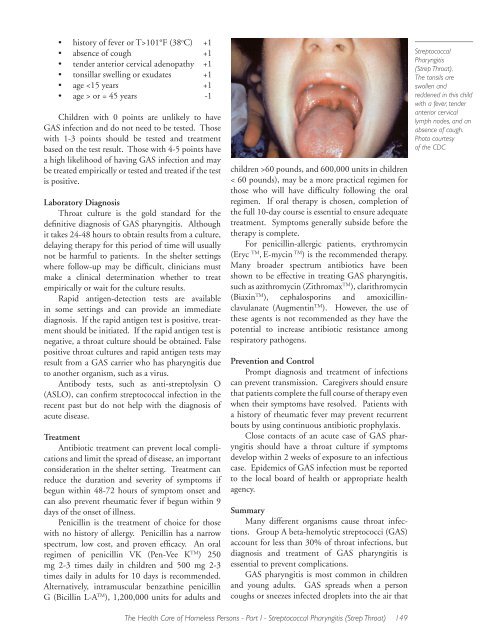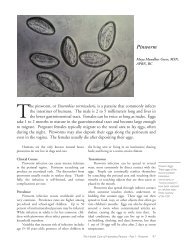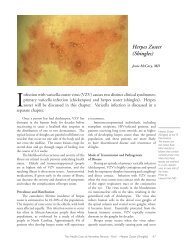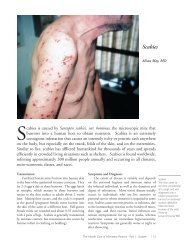Streptococcal Pharyngitis (Strep Throat) - Boston Health Care for the ...
Streptococcal Pharyngitis (Strep Throat) - Boston Health Care for the ...
Streptococcal Pharyngitis (Strep Throat) - Boston Health Care for the ...
You also want an ePaper? Increase the reach of your titles
YUMPU automatically turns print PDFs into web optimized ePapers that Google loves.
• history of fever or T>101°F (38 o C) +1<br />
• absence of cough +1<br />
• tender anterior cervical adenopathy +1<br />
• tonsillar swelling or exudates +1<br />
• age or = 45 years -1<br />
Children with 0 points are unlikely to have<br />
GAS infection and do not need to be tested. Those<br />
with 1-3 points should be tested and treatment<br />
based on <strong>the</strong> test result. Those with 4-5 points have<br />
a high likelihood of having GAS infection and may<br />
be treated empirically or tested and treated if <strong>the</strong> test<br />
is positive.<br />
Laboratory Diagnosis<br />
<strong>Throat</strong> culture is <strong>the</strong> gold standard <strong>for</strong> <strong>the</strong><br />
definitive diagnosis of GAS pharyngitis. Although<br />
it takes 24-48 hours to obtain results from a culture,<br />
delaying <strong>the</strong>rapy <strong>for</strong> this period of time will usually<br />
not be harmful to patients. In <strong>the</strong> shelter settings<br />
where follow-up may be difficult, clinicians must<br />
make a clinical determination whe<strong>the</strong>r to treat<br />
empirically or wait <strong>for</strong> <strong>the</strong> culture results.<br />
Rapid antigen-detection tests are available<br />
in some settings and can provide an immediate<br />
diagnosis. If <strong>the</strong> rapid antigen test is positive, treatment<br />
should be initiated. If <strong>the</strong> rapid antigen test is<br />
negative, a throat culture should be obtained. False<br />
positive throat cultures and rapid antigen tests may<br />
result from a GAS carrier who has pharyngitis due<br />
to ano<strong>the</strong>r organism, such as a virus.<br />
Antibody tests, such as anti-streptolysin O<br />
(ASLO), can confirm streptococcal infection in <strong>the</strong><br />
recent past but do not help with <strong>the</strong> diagnosis of<br />
acute disease.<br />
Treatment<br />
Antibiotic treatment can prevent local complications<br />
and limit <strong>the</strong> spread of disease, an important<br />
consideration in <strong>the</strong> shelter setting. Treatment can<br />
reduce <strong>the</strong> duration and severity of symptoms if<br />
begun within 48-72 hours of symptom onset and<br />
can also prevent rheumatic fever if begun within 9<br />
days of <strong>the</strong> onset of illness.<br />
Penicillin is <strong>the</strong> treatment of choice <strong>for</strong> those<br />
with no history of allergy. Penicillin has a narrow<br />
spectrum, low cost, and proven efficacy. An oral<br />
regimen of penicillin VK (Pen-Vee K TM ) 250<br />
mg 2-3 times daily in children and 500 mg 2-3<br />
times daily in adults <strong>for</strong> 10 days is recommended.<br />
Alternatively, intramuscular benzathine penicillin<br />
G (Bicillin L-A TM ), 1,200,000 units <strong>for</strong> adults and<br />
children >60 pounds, and 600,000 units in children<br />
< 60 pounds), may be a more practical regimen <strong>for</strong><br />
those who will have difficulty following <strong>the</strong> oral<br />
regimen. If oral <strong>the</strong>rapy is chosen, completion of<br />
<strong>the</strong> full 10-day course is essential to ensure adequate<br />
treatment. Symptoms generally subside be<strong>for</strong>e <strong>the</strong><br />
<strong>the</strong>rapy is complete.<br />
For penicillin-allergic patients, erythromycin<br />
(Eryc TM , E-mycin TM ) is <strong>the</strong> recommended <strong>the</strong>rapy.<br />
Many broader spectrum antibiotics have been<br />
shown to be effective in treating GAS pharyngitis,<br />
such as azithromycin (Zithromax TM ), clarithromycin<br />
(Biaxin TM ), cephalosporins and amoxicillinclavulanate<br />
(Augmentin TM ). However, <strong>the</strong> use of<br />
<strong>the</strong>se agents is not recommended as <strong>the</strong>y have <strong>the</strong><br />
potential to increase antibiotic resistance among<br />
respiratory pathogens.<br />
Prevention and Control<br />
Prompt diagnosis and treatment of infections<br />
can prevent transmission. <strong>Care</strong>givers should ensure<br />
that patients complete <strong>the</strong> full course of <strong>the</strong>rapy even<br />
when <strong>the</strong>ir symptoms have resolved. Patients with<br />
a history of rheumatic fever may prevent recurrent<br />
bouts by using continuous antibiotic prophylaxis.<br />
Close contacts of an acute case of GAS pharyngitis<br />
should have a throat culture if symptoms<br />
develop within 2 weeks of exposure to an infectious<br />
case. Epidemics of GAS infection must be reported<br />
to <strong>the</strong> local board of health or appropriate health<br />
agency.<br />
Summary<br />
Many different organisms cause throat infections.<br />
Group A beta-hemolytic streptococci (GAS)<br />
account <strong>for</strong> less than 30% of throat infections, but<br />
diagnosis and treatment of GAS pharyngitis is<br />
essential to prevent complications.<br />
GAS pharyngitis is most common in children<br />
and young adults. GAS spreads when a person<br />
coughs or sneezes infected droplets into <strong>the</strong> air that<br />
The <strong>Health</strong> <strong>Care</strong> of Homeless Persons - Part I - <strong><strong>Strep</strong>tococcal</strong> <strong>Pharyngitis</strong> (<strong>Strep</strong> <strong>Throat</strong>) 149<br />
<strong><strong>Strep</strong>tococcal</strong><br />
<strong>Pharyngitis</strong><br />
(<strong>Strep</strong> <strong>Throat</strong>).<br />
The tonsils are<br />
swollen and<br />
reddened in this child<br />
with a fever, tender<br />
anterior cervical<br />
lymph nodes, and an<br />
absence of cough.<br />
Photo courtesy<br />
of <strong>the</strong> CDC







